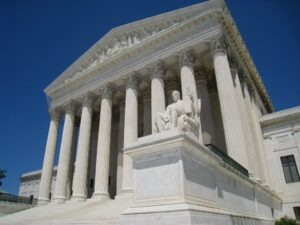
The name is paradoxical because the Equal Access to Justice Act (EAJA) only applies to a subset of all plaintiffs, namely, tax-exempt organizations and plaintiffs whose net worth falls below certain categorical thresholds. All other plaintiffs must pay their own attorney’s fees regardless of the litigation’s outcome.
If this law sounds like a windfall for plaintiff ’s attorneys, it is. An August 2011 study by the Government Accountability Office reported that between 2003 and 2010, the Treasury Department paid $14.2 million in attorney’s fees just to those plaintiffs suing the Environmental Protection Agency. The total for all agencies is unknown but estimated in the tens of millions annually.
If the law also sounds like a departure from the normal workings of our nation’s justice system, it is. The one-way fee-shifting arrangement (a federal agency cannot recoup its attorney’s fees from losing plaintiffs) is one of very few exceptions to the American rule of requiring each party in a lawsuit to bear its own legal expenses.
Surprisingly, the loudest cries for reforming the EAJA are not focused on the law’s enormous cost or exceptional nature. Rather, it is the alleged abuse of the Act by litigious environmental organizations that has drawn the ire of industry groups and Republican legislators.
According to Senator John Barrasso, “we have seen for years radical environmental organizations abusing EAJA.” Representative Cynthia Lummis singled out WildEarth Guardians, the Center for Biological Diversity, and Western Watersheds Project as “three organizations that are filing constant litigation, that have cottage industries built up to fund their lawyers and their lawsuits against federal agencies.”
The two Wyoming legislators are seeking to amend the Equal Access to Justice Act by extending the $7 million net worth cap to tax-exempt organizations, limiting the number of awards to any one group to three per year, and capping the maximum award for each case at $200,000. The bill, short titled the “Government Litigation Savings Act,” also strives for more accountability by requiring federal agencies to report all EAJA payments to a searchable online database.
If enacted, these reforms will undoubtedly curtail the concentration of EAJA payments to a handful of environmental litigation shops. But they are unlikely to diminish the overall impact of litigation on the actions of federal environmental agencies because the proposed reforms fail to address the financial risk asymmetry created by the Act’s one-way fee-shifting protocol.
As former chief of the Forest Service Jack Ward Thomas explained, “paying litigants to sue certainly encourages legal action.” By contrast, requiring each party to pay their own attorney’s fees, per the American rule, or requiring the loser to cover both parties’ fees, per the English rule of two-way fee shifting, discourages frivolous lawsuits.
Congress should exempt environmental cases from the Equal Access to Justice Act or impose two-way fee shifting on environmental litigants. Either reform would reduce the expected payoff from suing federal agencies and, at the margin, make environmental policy less litigious.



